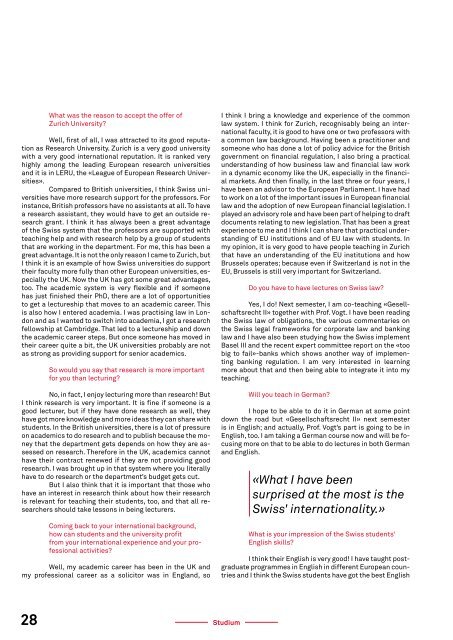Herbstausgabe 2010 - Fachverein Jus | Universität Zürich ...
Herbstausgabe 2010 - Fachverein Jus | Universität Zürich ...
Herbstausgabe 2010 - Fachverein Jus | Universität Zürich ...
Erfolgreiche ePaper selbst erstellen
Machen Sie aus Ihren PDF Publikationen ein blätterbares Flipbook mit unserer einzigartigen Google optimierten e-Paper Software.
What was the reason to accept the offer of<br />
Zurich University?<br />
Well, first of all, I was attracted to its good reputation<br />
as Research University. Zurich is a very good university<br />
with a very good international reputation. It is ranked very<br />
highly among the leading European research universities<br />
and it is in LERU, the «League of European Research Universities».<br />
Compared to British universities, I think Swiss universities<br />
have more research support for the professors. For<br />
instance, British professors have no assistants at all. To have<br />
a research assistant, they would have to get an outside research<br />
grant. I think it has always been a great advantage<br />
of the Swiss system that the professors are supported with<br />
teaching help and with research help by a group of students<br />
that are working in the department. For me, this has been a<br />
great advantage. It is not the only reason I came to Zurich, but<br />
I think it is an example of how Swiss universities do support<br />
their faculty more fully than other European universities, especially<br />
the UK. Now the UK has got some great advantages,<br />
too. The academic system is very flexible and if someone<br />
has just finished their PhD, there are a lot of opportunities<br />
to get a lectureship that moves to an academic career. This<br />
is also how I entered academia. I was practising law in London<br />
and as I wanted to switch into academia, I got a research<br />
fellowship at Cambridge. That led to a lectureship and down<br />
the academic career steps. But once someone has moved in<br />
their career quite a bit, the UK universities probably are not<br />
as strong as providing support for senior academics.<br />
So would you say that research is more important<br />
for you than lecturing?<br />
No, in fact, I enjoy lecturing more than research! But<br />
I think research is very important. It is fine if someone is a<br />
good lecturer, but if they have done research as well, they<br />
have got more knowledge and more ideas they can share with<br />
students. In the British universities, there is a lot of pressure<br />
on academics to do research and to publish because the money<br />
that the department gets depends on how they are assessed<br />
on research. Therefore in the UK, academics cannot<br />
have their contract renewed if they are not providing good<br />
research. I was brought up in that system where you literally<br />
have to do research or the department's budget gets cut.<br />
But I also think that it is important that those who<br />
have an interest in research think about how their research<br />
is relevant for teaching their students, too, and that all researchers<br />
should take lessons in being lecturers.<br />
Coming back to your international background,<br />
how can students and the university profit<br />
from your international experience and your professional<br />
activities?<br />
Well, my academic career has been in the UK and<br />
my professional career as a solicitor was in England, so<br />
I think I bring a knowledge and experience of the common<br />
law system. I think for Zurich, recognisably being an international<br />
faculty, it is good to have one or two professors with<br />
a common law background. Having been a practitioner and<br />
someone who has done a lot of policy advice for the British<br />
government on financial regulation, I also bring a practical<br />
understanding of how business law and financial law work<br />
in a dynamic economy like the UK, especially in the financial<br />
markets. And then finally, in the last three or four years, I<br />
have been an advisor to the European Parliament. I have had<br />
to work on a lot of the important issues in European financial<br />
law and the adoption of new European financial legislation. I<br />
played an advisory role and have been part of helping to draft<br />
documents relating to new legislation. That has been a great<br />
experience to me and I think I can share that practical understanding<br />
of EU institutions and of EU law with students. In<br />
my opinion, it is very good to have people teaching in Zurich<br />
that have an understanding of the EU institutions and how<br />
Brussels operates; because even if Switzerland is not in the<br />
EU, Brussels is still very important for Switzerland.<br />
Do you have to have lectures on Swiss law?<br />
Yes, I do! Next semester, I am co-teaching «Gesellschaftsrecht<br />
II» together with Prof. Vogt. I have been reading<br />
the Swiss law of obligations, the various commentaries on<br />
the Swiss legal frameworks for corporate law and banking<br />
law and I have also been studying how the Swiss implement<br />
Basel III and the recent expert committee report on the «too<br />
big to fail»-banks which shows another way of implementing<br />
banking regulation. I am very interested in learning<br />
more about that and then being able to integrate it into my<br />
teaching.<br />
Will you teach in German?<br />
I hope to be able to do it in German at some point<br />
down the road but «Gesellschaftsrecht II» next semester<br />
is in English; and actually, Prof. Vogt's part is going to be in<br />
English, too. I am taking a German course now and will be focusing<br />
more on that to be able to do lectures in both German<br />
and English.<br />
«What I have been<br />
surprised at the most is the<br />
Swiss' internationality.»<br />
What is your impression of the Swiss students'<br />
English skills?<br />
I think their English is very good! I have taught postgraduate<br />
programmes in English in different European countries<br />
and I think the Swiss students have got the best English<br />
«I think that if you are doing something<br />
you are not happy with, do not be afraid to<br />
change!»<br />
(laughs). In my opinion, this is a tribute to the Swiss «Gymnasiums»<br />
because they require students to learn English to<br />
graduate. So the Swiss students' English is very understandable<br />
for me and I do not think that I talk to fast for them;<br />
of course, they are very polite, but they seem to understand<br />
it. And after having graded exams from the «Financial Market<br />
Law» master course last semester, I thought that those<br />
who wrote the exam wrote in very good English – probably as<br />
good as my British students (laughs).<br />
What is your opinion; does teaching law in a foreign<br />
language have a future?<br />
I think that it depends on the law you are teaching.<br />
For international law, teaching in a foreign language is definitely<br />
the future. But law is very much a creature of language<br />
and to understand it fully, for the student who is learning it<br />
for the first time, it is probably better to study the local law<br />
in their own language.<br />
However, in jurisdictions that are very international<br />
and very global like Switzerland, there is a need that once<br />
you have learned your law in your own language to then be<br />
able to know what it means in English. Zurich's vibrancy as<br />
an economic area depends a lot on foreign investment. The<br />
international business language being English, multinational<br />
companies here in Zurich are in need of having lawyers who<br />
can express what the law means in English. So I think one<br />
of the strengths of Zurich as an international business centre<br />
is the fact that you can walk into many of these business<br />
headquarters in the Zurich area like Kraft Foods, you know, a<br />
big American multinational who has got a big headquarters<br />
building in Oerlikon for their European operations, you walk<br />
in there and everyone is speaking American English! I think<br />
one of the reasons these companies have headquarters<br />
here is because they realise that Switzerland has not only<br />
got a great quality of life but also has linguistically versatile<br />
employees. They speak three or four languages and most of<br />
them speak very good English, especially if they have gone<br />
to university. Switzerland is a very versatile market for foreign<br />
investment, for multinational companies to come and<br />
set up and to use Switzerland as a base from which to trade<br />
throughout the EU. I think that this is at least in part due to<br />
the linguistic versatility of the Swiss workforce.<br />
Do you try to support or strengthen this<br />
internationality of Zurich University, for example<br />
by a joint seminar with a British university?<br />
Yes, we had a meeting two days ago and I proposed<br />
a joint Zurich-UK seminar next semester to be with a British<br />
university. I am now working on the logistics, where the students<br />
would have to stay, how much it would cost and that<br />
kind of thing. But I proposed that and I hope it will get approved<br />
for next semester.<br />
Also, I will be jointly teaching a seminar next semester<br />
with Prof. Kellerhals on the US-Swiss business law which<br />
is offered with Miami Law School. First, the Zurich students<br />
go to Miami for three or four days of seminars and presentations<br />
and then for the second half of the seminar the Miami<br />
students come to Zurich. Prof. Kellerhals did this seminar<br />
already last year with Prof. Vogt and I am looking forward to<br />
working on that! In fact, I actually am a member of the Florida<br />
Bar and I practised in Miami for eight years before coming<br />
to Britain. So I am a member of both the English Bar and the<br />
Florida Bar and I think I could tell students about Florida law<br />
as they conduct their research and I could have a good comparative<br />
analysis with Swiss law.<br />
You said that you have worked and taught<br />
in different countries. Would you say that there is<br />
a difference between Swiss students and<br />
European students in general and British students<br />
in particular?<br />
I think that the students in the UK, the US and in<br />
Switzerland are in many ways very similar. The Swiss students<br />
remind me more of the American students than the<br />
«I would not take a career<br />
path simply because of the<br />
financial rewards.»<br />
UK students. The UK students start university at the age of<br />
eighteen, so one thing I noticed is that the undergraduates in<br />
the UK are a bit younger and have possibly less knowledge<br />
of what they want to study. They normally pick a subject not<br />
fully knowing what it means. I think the Swiss students are<br />
more mature in knowing what they want to do regarding their<br />
academic studies.<br />
Another thing is that the Swiss students are just<br />
much better at languages and much more multinational. The<br />
British students often do not know other languages. They<br />
are normally very well educated but they want to stay basically<br />
in Britain whereas in Swiss students, I see more of<br />
an interest in going abroad as part of their education. That<br />
is a more normal part of a Swiss university student's future<br />
28 Studium Studium<br />
29






